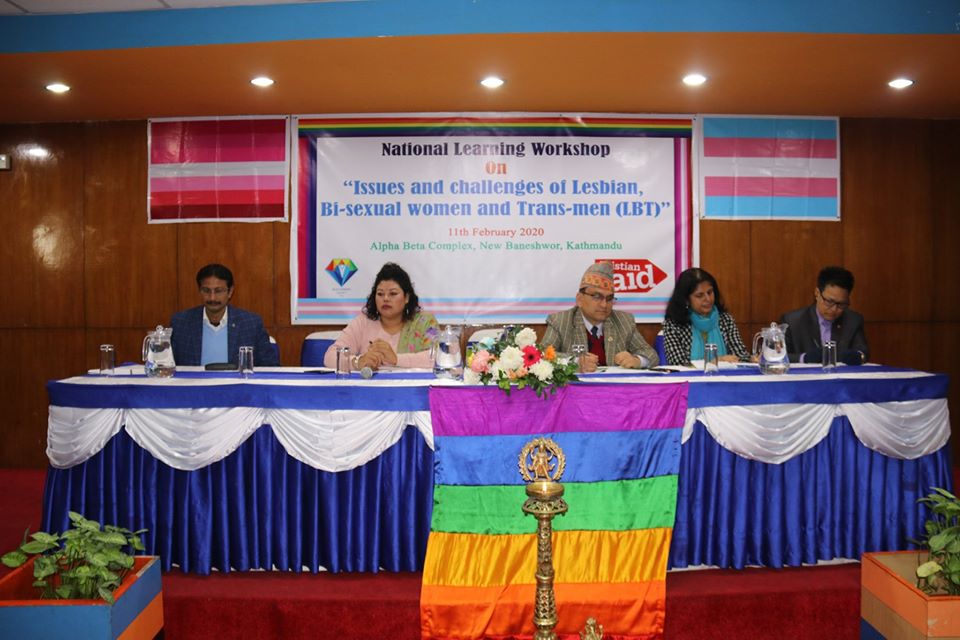On 11 February 2020, Blue Diamond Society and Christian Aid co-hosted a national workshop on “Issues and challenges of Lesbian, Bi-sexual women & Trans men (LBT) in Nepal.” As part of our joint ‘Reaching the Unreached LBT population’ project, we have focused on the importance of mental health services for the LBT community and strengthening knowledge of health practitioners in regards to LBT-friendly health services. Through advocacy and outreach, the project seeks to raise awareness of the challenges and issues faced by the LBT community when accessing health care and services. It also seeks to sensitize healthcare practitioners on the unique needs of LBT individuals and shift the social norms in providing access to healthcare services.
“Due to the patriarchal culture in Nepal, LBT people often face more stigma and discrimination when it comes to accessing health services.”
Pinky Gurung, President, Blue Diamond Society
In her opening remarks, BDS President Pinky Gurung encouraged all participants to share their experiences with accessing health services and interacting with health care practitioners to better inform the project and support its key goals.
The workshop included a panel discussion on LBT communities and their issues including challenges related to citizenship, marriage and adoption and sexual reproductive health and rights. Dr. Kamal Gautam, the executive director of TPO Nepal, presented on LBT and mental health, including where and how to seek help.
Mani Kumar, Country Director of Christian Aid Nepal commended the efforts of BDS in its achievements with this project thus far.
“The project through its advocacy, research and findings has been successful in a very short time to bring meaningful changes both in the mindsets of the people in the LBT community and sensitizing policy makers and health practitioners on LBT-friendly health services.”
Mani Kumar, Country Director, Christian Aid Nepal
As part of the event, we welcomed distinguished speakers including the Honourable Krishna Bhakta Pokhrel, Chairperson of the Human Rights Committee; Bharat Sharma, Under Secretary at the Ministry of Women, Children and Senior Citizens; Dhundi Raj Lamichhane, Director of the National Census Board; Badri Pun, President of Inclusive Forum, Sarita K.C., Director of Mitini Nepal; and Wenny Kusuma, Country Director of UN Women.
We closed the workshop with the signing of an LBT declaration paper, which enlists recommendations finalized through local and national consultations with LBT individuals, government stakeholders, and academia highlighting the key issues and challenges faced by the LBT community.
Summary of the “Reaching the Unreached” project findings:
- Restriction to the people’s right to their sexuality and forced assimilation to embrace certain accepted societal standards disrupts an individual’s mental well-being and health
- Lesbian, bisexual women and trans-men face more stigma and discrimination and are prone to increased anxiety, depression and suicidal tendencies
- Trans-men suffer from uterus prolapse, complications in menstruation and pregnancy and are often discriminated by health service providers because of their transitional appearance
- Married women who come out as bisexual are often categorized as “home wreckers” with little or no respect for cultural and family values
- The fear of ostracization forces LBT individuals to hide their innate behaviour leading to sexual frustration, depression, anxiety and suicidal thoughts
- Peole who identiyf themselves as lesbians are often forced to get married and there are incidents of marital rape and abuse which have an adverse effect in an individual’s mental health
- Lack of well-informed and LGBTI oriented health providers leads to discrimination and at times creates situation of confrontation and abuse
- A majority of LBT individuals have cited confidentiality as one of the major barriers for access to mental health services
Watch the documentary of the project which highlights the social norms shift of health practitioners towards the LBT population.
For more information regarding access to mental health services in an LGBTIQ+ friendly environment in Nepal, contact TPO Nepal.
www.tponepal.org
01-4424082
Toll-free: 1660 010 2005
अनेक मार्ग, Kathmandu 44600
